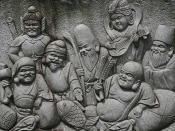a) Explain the traditional forms of the ontological argument put forward by Anselm and Descartes. (33 marks)
The ontological argument is a deductive a priori argument that attempts to prove God's existence from logical reasoning. The first and best known ontological argument was proposed by St Anselm (Archbishop of Canterbury) in his writings 'Proslogion', however since then variations have been developed by other philosophers such as Rene Descartes, Gottfried Leibnix, Norman Malcolm, Charles Hartshorne and Alvin Plantinga; a modal logic version of the argument was formulated by Kurt Godel. The argument itself examines the concept and definition of God, stating that this implies the existence of God - it is to contradict oneself to say that God does not exist. There have been many versions because each one begins with a different notion or definition of God.
In Proslogion Anselm wrote that he wished to form a single argument that 'needed nothing but itself alone for proof' and an argument that would, alone, be enough to prove that God exists and that he is the 'supreme God' Anselm belonged to a group called the 'early scholastics'; these were people who taught in religious schools, and used reasoning to solve problems.
St Anselm states that the argument that can prove God's existence stems primarily from the definition of 'God', which he concluded as "something than which nothing greater can be thought", meaning God is the greatest possible being. Anselm was not referring to something that happens to be greater than anything else, materialistically; he is rather referring to his idea of perfection, of the 'absolute'. Regardless of whether you believe he exists or not, Anselm said that one could still comprehend this definition - and is able to imagine the greatest possible being. He then developed this definition, stating that...


